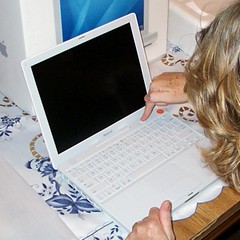Apple, ruthless capitalist
Permalinks to this entry: individual page or in monthly context. For more material from my journal, visit my home page or the archive.
 Those of us who use computers made by Apple (and I've been one for 25 years now) tend to have a rosy picture of the company: as an innovative, artsy underdog, more interested in style and a good user experience than in raking in money, like big bad Microsoft, IBM, and Dell. Yeah, sometimes the company does dumb things, but we forgive it like a prodigy—after all, sometimes genius breeds eccentricity, right?
Those of us who use computers made by Apple (and I've been one for 25 years now) tend to have a rosy picture of the company: as an innovative, artsy underdog, more interested in style and a good user experience than in raking in money, like big bad Microsoft, IBM, and Dell. Yeah, sometimes the company does dumb things, but we forgive it like a prodigy—after all, sometimes genius breeds eccentricity, right?
That is utter BS. While the company and its co-founder and leader Steve Jobs are style mavens (most of the time), that's because emphasizing style and usability helps them rake in the money, which is precisely what Apple is doing right now. People spent 150% more on Apple stuff this quarter than last year at at this time, and profits on those sales are up more than 500%. While sticking to their principles of good design (again, most of the time), Apple's team is also competing ruthlessly, using subterfuge and sometimes turning the company on a dime in order to sell more stuff, and keep competitors selling less stuff.
Two recent examples:
- John Gruber's analysis shows why Apple rushed madly to include podcasting support in iTunes, bugs and all, even while it's still an infant technology, and small podcasting startup companies haven't even made it to market yet. (Most podcasters are still talking about podcasting, and interviewing other podcasters—always a sign of early days.) In short, it is a way to solidify Apple's lead in the MP3 player market. A big reason to do it right away was also to establish podcasting (based on iPod) as the word, so that when referring to audio subscriptions, everyone else who makes players either has to use the name of Apple's product or try to ignore the trend and hope it goes away. Take that!
- In The Register, Andrew Orlowski points out that Apple's recent commitment to using Intel processors starting next year might not be based on technology alone, since IBM has some powerful stuff coming in the current PowerPC architecture. Instead, Jon Stokes at Ars Technica thinks that it may be more of an attempt from Apple to get good prices on silicon chips for Macs, iPods, and other devices. In other words, never mind pure technological elegance: it's about the business.
Does it work? Between buying my Power Mac G3 in 1998 and our eMac last year, I had hardly spent anything at all on new Apple products. Now, just since the beginning of this year, my family has two new iPod shuffles, several accessories for them (including an Apple-branded sport case), and, most recently, a brand new iBook. The last one was the biggest expenditure, and my wife made it. Unlike me, she is no Apple zealot—last year she had been thinking of buying a Windows laptop.
That's all money that didn't go to Dell or Creative or HP or Sony or Microsoft. I guess the ruthlessness pays off.







